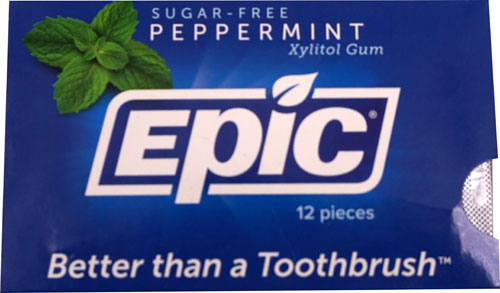Are you a gum person? You may be surprised to learn that this common habit has some distinct wellness benefits, depending on the kind of gum you choose, of course. As it happens, over 157.23 million Americans are on the chew, based on $3.5 billion dollars’ worth of chewing gum sold in 2024, according to
Statista.com. Some of these devotees chew a stick of gum a few times a week, while active gum-lovers opt for three pieces a day.

What is Gum Made Of?
What
is gum? Nutritionally speaking, it typically consists of a gum base, such as chicle, a natural gum that comes from the sapodilla tree, plus a sweetener, then a softening agent?such as glycerin or vegetable oil?and finally, a flavoring. As you might imagine, the most common sweetener in mass-market gum is processed, refined sugar. In fact, sugar-based commercial gums consist of almost
80 percent sugar by weight.
Commercial gum products may also include artificial colors, flavors, and other chemical additives. So, again, while the act of chewing gum has benefits, the
type of gum you select makes all the difference.
Benefits of Chewing Gum
Although not all gum products are created equal in terms of nutritional quality, there
are some notable benefits to be found from the physical act of chewing.
Improves oral health
According to the American Dental Association (ADA), chewing gum increases salivary flow and volume and stimulates oral taste receptors. This is beneficial as saliva carries calcium and phosphate ions which help to mineralize the teeth and also reduces cavity risk by helping to wash away acids and food residue left in the mouth after eating and drinking.
Increases focus & reduces stress
Could chewing gum enhance your mental and emotional health? Maybe so, according to a
study conducted to determine the effect of chewing gum on stress, anxiety, depression, self-focused attention and exam success. The findings suggest that chewing gum may increase focus by helping to reduce stress and anxiety. Chewing gum may also support healthy short-term memory, and potentially helps students to better manage test-related stress and anxiety.
When Chewing Gum is No Longer Healthy
Given the potential benefits from the act of chewing gum, which options are healthiest overall? For starters, you would be well advised to steer clear of sugar-packed commercial products, which can be
harmful to teeth because sugar is digested by the ‘bad’ bacteria in your mouth, promoting an increase in the amount of plaque on your teeth and tooth decay over time.
Refined sugar, particularly in the form of sweetened products, is also a leading cause of tooth decay in US children. And that’s not all. Excess sugar's impact on obesity and diabetes is well documented. Science from
Harvard University reveals that consuming too much added sugar can also raise blood pressure and increase chronic inflammation, both of which are pathological pathways to heart disease.
Excess consumption of sugar in drinks and gum also promote weight gain by tricking your body into turning off its appetite-control system because liquid calories are far less satiating than calories from solid foods. Even more worrisome, the effects of excess sugar consumption—higher blood pressure, inflammation, weight gain, diabetes, and fatty liver disease—all appear to be linked to a greater risk for
heart attack and stroke.
One research team discovered over the course of a
15-year study that people who got 17-21 percent of their calories from added sugar had a 38 percent higher risk of dying from cardiovascular disease compared with those who consumed 8 percent of their calories as added sugar.
Understanding sugar alternatives in gum
If you want to reduce sugar intake for yourself and your family, opting for products without sugar generally is a good start, but sugar-free products vary in quality, with some using artificial sweeteners, and others relying on natural sources. Sugar alternatives typically include:
- Sugar alcohols derived from berries and other fruits, such as xylitol, isomalt, maltitol, mannitol, and sorbitol.
- Aspartame, which is an artificial sweetener made from two amino acids—phenylalanine and aspartic acid.
- This natural sweetener is made from the leaves of the stevia plant.
When it comes to chewing gum, we now know that products sweetened naturally with xylitol are
more effective than other sugar-free gums at preventing tooth decay, in part because xylitol helps prevent the growth of the bacteria that cause
tooth decay and bad breath. How effective is xylitol when it comes to oral hygiene? One
research team found that chewing xylitol-sweetened gum reduced the number of bad bacteria in the mouth by up to
75 percent!
Along with supporting optimal oral health, could gum that is sweetened with xylitol rather than sugar also promote healthy weight loss? Some scientists think so. For example,
one study found that chewing sugarless gum between meals decreases feelings of hunger and reduces intake of high carb snacks in the afternoon. There is even
some evidence that chewing gum may support a healthy, efficient rate of metabolism.
7 Best Xylitol Gum Options at Vitacost
Given the oral health benefits of xylitol-sweetened gum, and the fact that it is well tolerated by most people, what are your best gum choices for you? Fortunately, your options abound! Innovative, beneficial selections include:
1. XyliChew Non-GMO Soft Chewing Gum
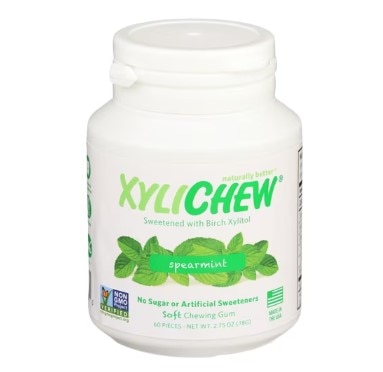
XyliChew uses only quality ingredients, no sugar or artificial sweeteners and relies on Birch Xylitol for a natural sweet taste. Try Spearmint, Black Licorice and Cinnamon.
2. Spry Dental Defense Sugar-Free Gum with Xylitol
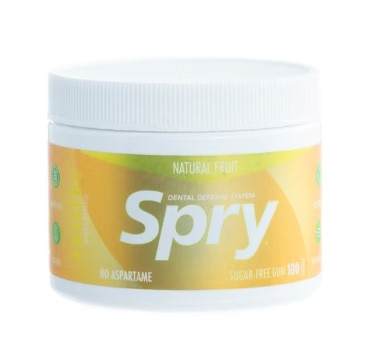
This aspartame-free, sugar-free gum featuring xylitol has been called a dental defense system. Try it in Natural Fruit, Cinnamon, Peppermint and Spearmint flavors.
3. Stevita Naturals Hum Sugar Free Gum
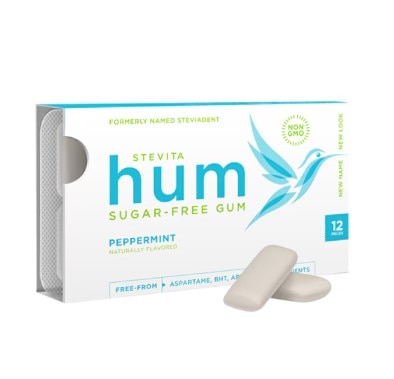
The main active ingredient in SteviaDent is 95% pure Stevita crystal, plus anti-cavity crusading xylitol. Available in Peppermint and Cinnamon.
4. Pur Company Pur Gum
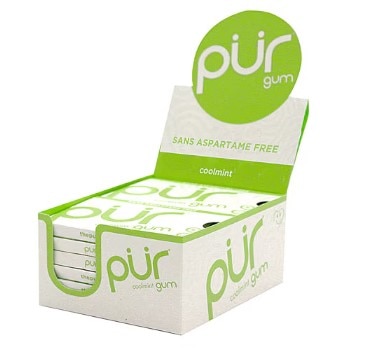
This naturally flavored, aspartame-free gum support oral health. Check it out in Chocolate Mint, Peppermint, Cinnamon, Bubblegum, Spearmint, Pomegranate Mint and Wintergreen.
5. Epic Dental Xylitol Gum
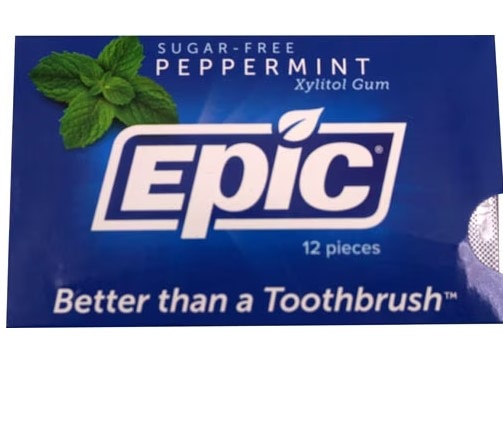
This sugar-free gum alternative sweetened with all-natural xylitol is the next best thing to a toothbrush. Available in Peppermint, Spearmint, Fresh Fruit and Cinnamon flavors.
6. Peelu Chewing Gum with Xylitol Cinnamon Sass
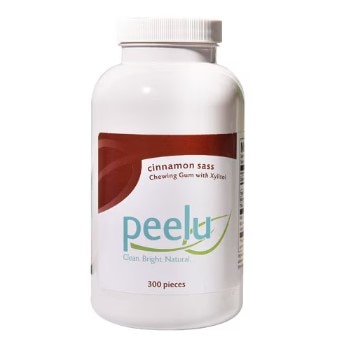
The fibers of the peelu tree have been used for centuries in Asia and the Middle East for cleansing and whitening teeth. Brighten your smile naturally with Peelu Chewing Gum, also available in Spearmint, Peppermint Blast and Citrus Breeze.
7. Tree Hugger Classic Bubble Gum Sweetened with 100% Xylitol
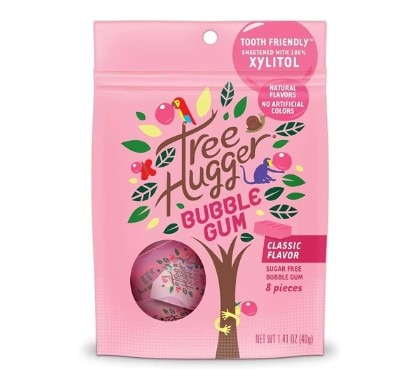
Blow some bubbles! Why not let the kid in your come out as you enjoy this naturally sweetened, tooth-friendly bubble gum.
If you find this information places chewing gum in a whole new light for you, that’s great news, because there are many healthy options with demonstrably beneficial effects on overall dental wellness. Cheers to your pearly whites!
 XyliChew uses only quality ingredients, no sugar or artificial sweeteners and relies on Birch Xylitol for a natural sweet taste. Try Spearmint, Black Licorice and Cinnamon.
2. Spry Dental Defense Sugar-Free Gum with Xylitol
XyliChew uses only quality ingredients, no sugar or artificial sweeteners and relies on Birch Xylitol for a natural sweet taste. Try Spearmint, Black Licorice and Cinnamon.
2. Spry Dental Defense Sugar-Free Gum with Xylitol
 This aspartame-free, sugar-free gum featuring xylitol has been called a dental defense system. Try it in Natural Fruit, Cinnamon, Peppermint and Spearmint flavors.
3. Stevita Naturals Hum Sugar Free Gum
This aspartame-free, sugar-free gum featuring xylitol has been called a dental defense system. Try it in Natural Fruit, Cinnamon, Peppermint and Spearmint flavors.
3. Stevita Naturals Hum Sugar Free Gum
 The main active ingredient in SteviaDent is 95% pure Stevita crystal, plus anti-cavity crusading xylitol. Available in Peppermint and Cinnamon.
4. Pur Company Pur Gum
The main active ingredient in SteviaDent is 95% pure Stevita crystal, plus anti-cavity crusading xylitol. Available in Peppermint and Cinnamon.
4. Pur Company Pur Gum
 This naturally flavored, aspartame-free gum support oral health. Check it out in Chocolate Mint, Peppermint, Cinnamon, Bubblegum, Spearmint, Pomegranate Mint and Wintergreen.
5. Epic Dental Xylitol Gum
This naturally flavored, aspartame-free gum support oral health. Check it out in Chocolate Mint, Peppermint, Cinnamon, Bubblegum, Spearmint, Pomegranate Mint and Wintergreen.
5. Epic Dental Xylitol Gum
 This sugar-free gum alternative sweetened with all-natural xylitol is the next best thing to a toothbrush. Available in Peppermint, Spearmint, Fresh Fruit and Cinnamon flavors.
6. Peelu Chewing Gum with Xylitol Cinnamon Sass
This sugar-free gum alternative sweetened with all-natural xylitol is the next best thing to a toothbrush. Available in Peppermint, Spearmint, Fresh Fruit and Cinnamon flavors.
6. Peelu Chewing Gum with Xylitol Cinnamon Sass
 The fibers of the peelu tree have been used for centuries in Asia and the Middle East for cleansing and whitening teeth. Brighten your smile naturally with Peelu Chewing Gum, also available in Spearmint, Peppermint Blast and Citrus Breeze.
7. Tree Hugger Classic Bubble Gum Sweetened with 100% Xylitol
The fibers of the peelu tree have been used for centuries in Asia and the Middle East for cleansing and whitening teeth. Brighten your smile naturally with Peelu Chewing Gum, also available in Spearmint, Peppermint Blast and Citrus Breeze.
7. Tree Hugger Classic Bubble Gum Sweetened with 100% Xylitol
 Blow some bubbles! Why not let the kid in your come out as you enjoy this naturally sweetened, tooth-friendly bubble gum.
If you find this information places chewing gum in a whole new light for you, that’s great news, because there are many healthy options with demonstrably beneficial effects on overall dental wellness. Cheers to your pearly whites!
Blow some bubbles! Why not let the kid in your come out as you enjoy this naturally sweetened, tooth-friendly bubble gum.
If you find this information places chewing gum in a whole new light for you, that’s great news, because there are many healthy options with demonstrably beneficial effects on overall dental wellness. Cheers to your pearly whites!



